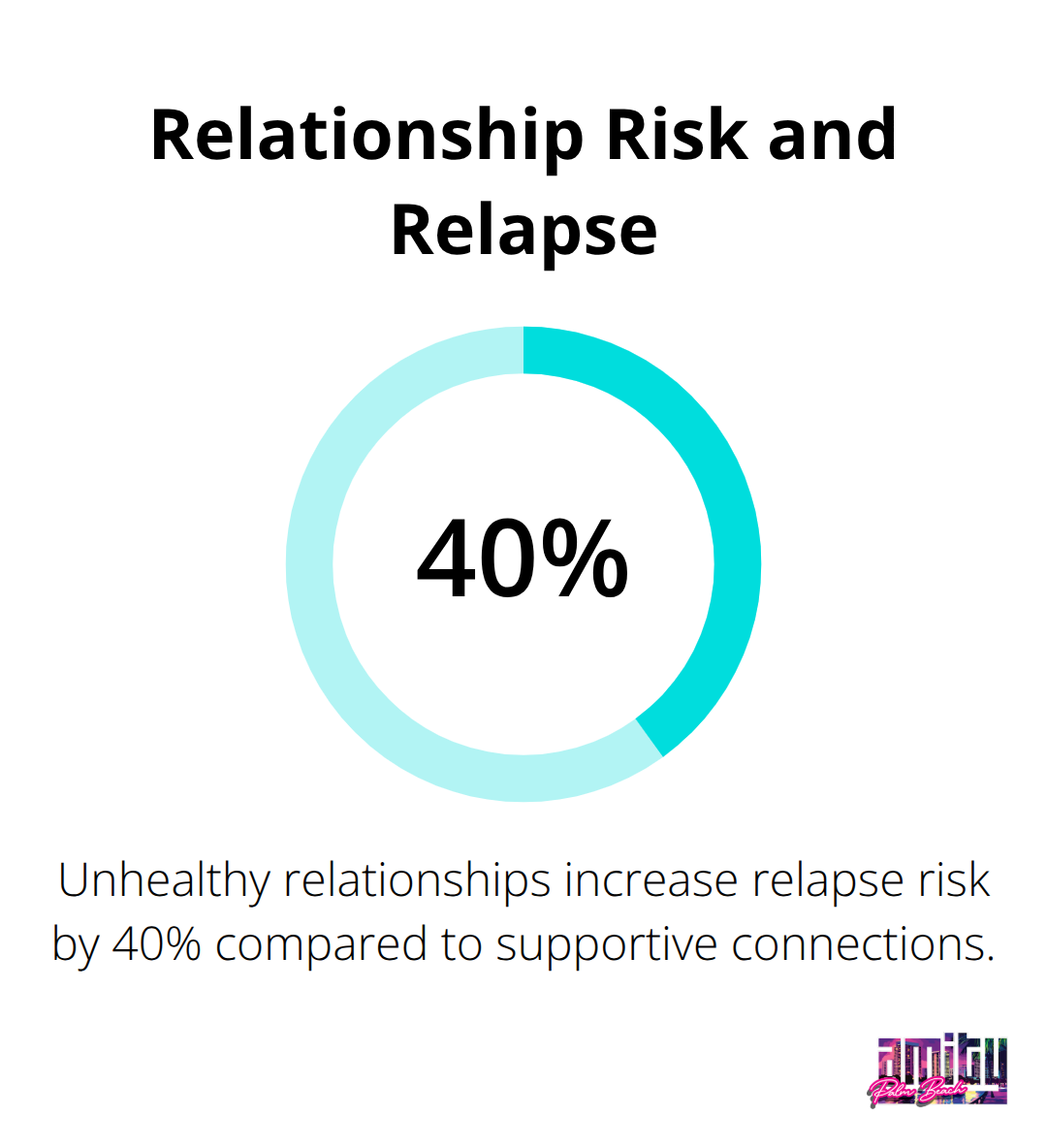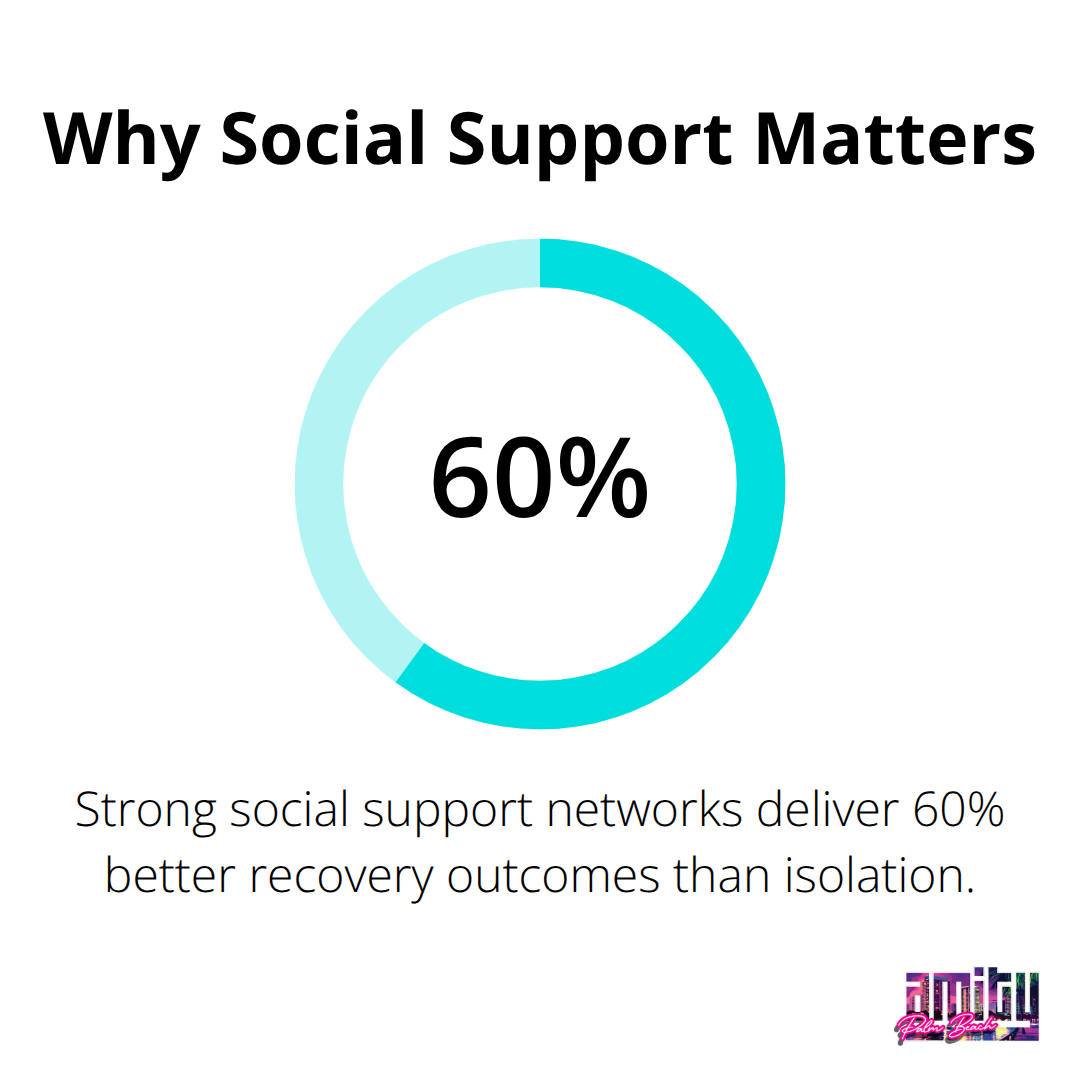Recovery from addiction marks the beginning of rebuilding your life, including the relationships that matter most. Relationships after drug rehab require intentional effort, patience, and new skills to thrive.
We at Amity Palm Beach understand that forming healthy connections while maintaining sobriety presents unique challenges. The path forward involves rebuilding trust, creating supportive networks, and setting boundaries that protect your recovery journey.
How Do You Rebuild Trust After Addiction?
Start with Complete Honesty About Past Actions
Trust rebuilds when you own every mistake without excuses or justifications. Research shows that family members of people in recovery rate honesty as the single most important factor in relationship repair. Write a detailed letter to each family member that acknowledges specific ways your addiction hurt them. Include financial damage, missed events, broken promises, and emotional pain you caused. Avoid phrases like “I was sick” or “the addiction made me do it.” Instead, use direct language: “I chose drugs over your birthday,” or “I stole money from your wallet.” This level of accountability feels uncomfortable, but it demonstrates genuine change to your loved ones.
Prove Change Through Daily Actions
Trust rebuilds through consistent behavior over months, not grand gestures. Research indicates that family trust restoration requires rebuilding relationships, restoring trust, and reestablishing the family’s place through consistent sobriety and reliable behavior. Create a daily check-in system with family members where you share your recovery activities, therapy attendance, and emotional state. Follow through on every commitment, no matter how small. If you promise to call at 7 PM, call at 6:55 PM (this shows respect for their time). Pay back borrowed money in agreed installments. Attend family events sober and engaged. Show up for household responsibilities without prompts. These small, repeated actions rebuild trust faster than any apology ever could.
Accept That Some Relationships May Never Fully Heal
Not every relationship will return to its previous state, and pressure for immediate forgiveness often backfires. Focus your energy on family members who show willingness to rebuild rather than those who remain distant. Give people permission to set boundaries with you. If your sister needs six months before she feels comfortable having you around her children, respect that timeline completely. Some family members may need professional therapy to process their own trauma from your addiction before they can engage in relationship repair (and that’s their right).
Move Beyond Family to Build New Connections
Once you establish a foundation of trust with willing family members, you’ll need to expand your social circle beyond these relationships. The skills you develop in family trust repair-honesty, consistency, and respect for boundaries-become the building blocks for all future relationships in your recovery journey.
Where Do You Find Sober Friends After Treatment?
Start with 12-Step Programs and Recovery Groups
Alcoholics Anonymous and Narcotics Anonymous meetings offer the fastest path to a sober social network. Research shows that people who attend AA meetings regularly have improved outcomes compared to those who don’t attend. Visit different meetings in your area to find groups where you connect with the personalities and discussion style. Morning meetings attract professionals who work traditional hours, while evening meetings often include people with more flexible schedules. Exchange phone numbers with three people who have similar recovery timelines and life circumstances. These initial connections become your foundation for wider sober communities.
Build Friendships Through Recovery Activities and Hobbies
Join sober recreational groups that meet regularly around shared interests rather than just shared addiction history. Sober hiking groups, book clubs, volleyball leagues, and cooking classes create natural opportunities for friendship without the pressure to discuss your recovery constantly. Research indicates that people with strong social support networks have better recovery outcomes. Choose activities that happen weekly so you see the same people repeatedly and can develop genuine friendships over time. Avoid bars, clubs, and events where alcohol serves as the central focus (even if they offer non-alcoholic options).
Practice Social Skills in Low-Pressure Environments
Recovery often means you must relearn how to have fun and connect with people without substances. Start with structured activities like volunteer work at animal shelters or food banks where conversation flows naturally around shared tasks. These environments let you practice small talk, active listening, and empathy without the anxiety of formal social situations.

Graduate to coffee meetups, lunch dates, and group activities as your confidence builds. Set a goal to attend one new social activity each week for three months to expand your comfort zone systematically.
The friendships you develop through these sober communities provide the foundation for all your future relationships. However, even the strongest friendships require clear boundaries to protect your recovery and maintain healthy connections with everyone in your life. Sober living environments can also provide valuable opportunities to form lasting friendships with others who understand your journey.
How Do You Protect Your Recovery Through Boundaries?
Recognize the Red Flags of Toxic Relationships
Toxic relationships threaten your sobriety more than any other external factor. Research shows that people in unhealthy relationships face a 40% higher relapse risk compared to those with supportive connections. Watch for these warning signs: friends who minimize your recovery progress, family members who guilt-trip you about past mistakes, or romantic partners who pressure you to drink or use drugs just once.

People who consistently drain your emotional energy, create drama, or refuse to respect your recovery boundaries must be removed from your inner circle immediately. Document these interactions in a journal to identify patterns and make objective decisions about which relationships serve your recovery.
Set Non-Negotiable Limits and Communicate Them Directly
Successful boundary work requires specific language and unwavering consistency. Tell people exactly what you will and won’t accept: I don’t attend events where drugs are the main activity, I leave conversations that focus on getting high, and I won’t lend money to anyone who actively uses substances. Practice these phrases until they feel natural: That doesn’t work for me, I’m not comfortable with that, and I need to leave now. Research indicates that people who clearly communicate their recovery needs have stronger long-term sobriety outcomes. Write down your top five boundaries and share them with your sponsor, therapist, and closest sober friends who can hold you accountable when you feel tempted to compromise these standards.
Navigate Relationships with Active Users Through Strategic Distance
You cannot maintain close relationships with people who actively use drugs or alcohol without risking your recovery. This includes family members, longtime friends, and romantic partners who refuse to support your sobriety. Create physical distance by avoiding their homes, changing your phone number if necessary, and declining invitations to gatherings where substances will be present. For family relationships you cannot completely sever, limit contact to supervised public settings like restaurants during daylight hours (this reduces temptation and provides natural exit opportunities). Set a timer for these visits and leave when it expires, regardless of protests or guilt tactics.
Handle Boundary Violations with Immediate Consequences
People will test your boundaries repeatedly to see if you mean what you say. When someone crosses a line you’ve clearly established, respond immediately with predetermined consequences. If your brother brings alcohol to your home after you’ve asked him not to, end the visit that moment and ask him to leave. If a friend continues to share stories about their drug use despite your requests to stop, walk away from the conversation or hang up the phone. Delayed responses to boundary violations teach people that your limits are negotiable (they’re not). Your recovery depends on swift, consistent enforcement of the standards you’ve set, and establishing clear boundaries remains one of the most critical skills for long-term success.
Final Thoughts
Relationships after drug rehab demand three core strategies: honest communication, firm boundaries, and professional support. Research shows that people with strong social support networks achieve 60% better recovery outcomes compared to those who remain isolated. Professional guidance accelerates relationship repair through proven methods that address both individual growth and family healing.

Individual therapy develops your communication abilities, while family counseling tackles trauma from your addiction period. We at Amity Palm Beach integrate relationship support into our treatment programs because healthy connections form the foundation of sustained recovery. These therapeutic approaches provide structured frameworks for rebuilding damaged relationships and creating new supportive bonds.
People in recovery with supportive relationships report higher life satisfaction, improved mental health, and stronger motivation to maintain sobriety. These connections offer accountability during challenging moments and celebration during recovery milestones (which reinforces positive progress). Your investment in relationship work today creates a support network that sustains your recovery for years ahead.




